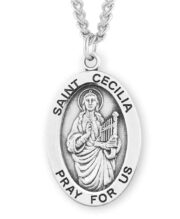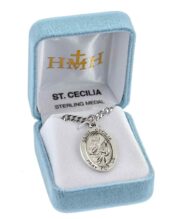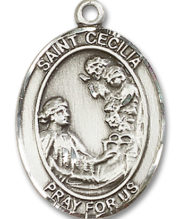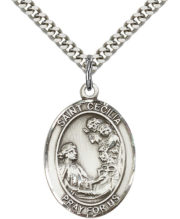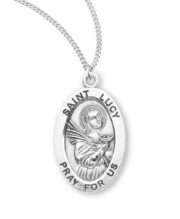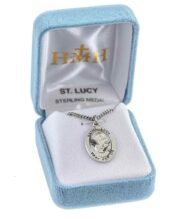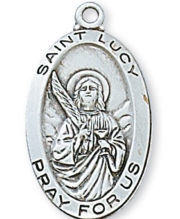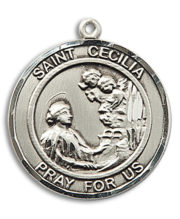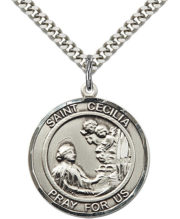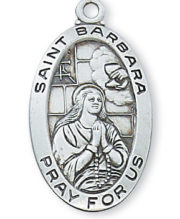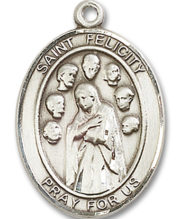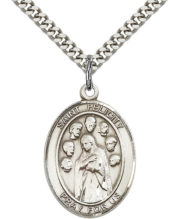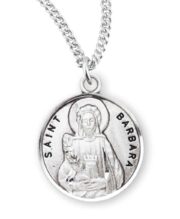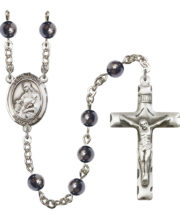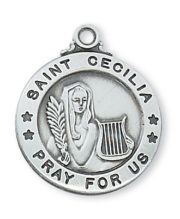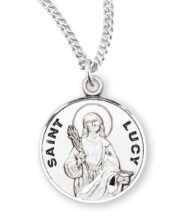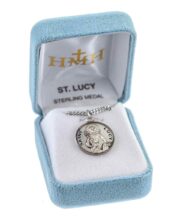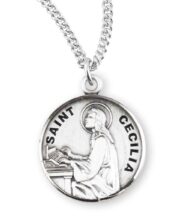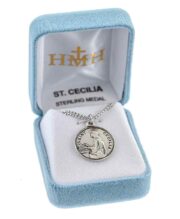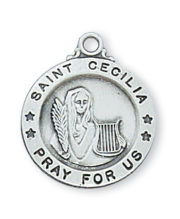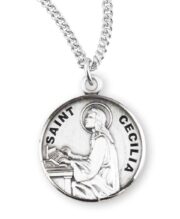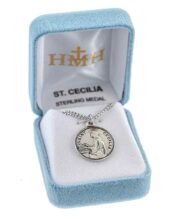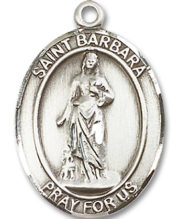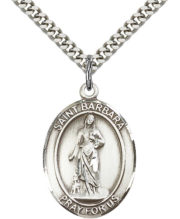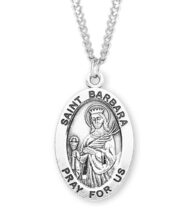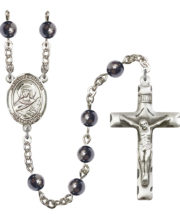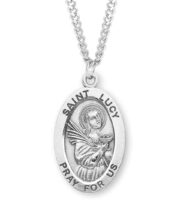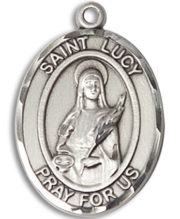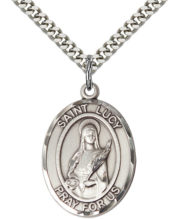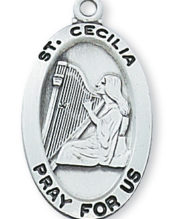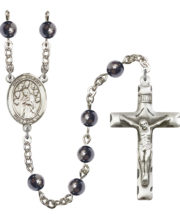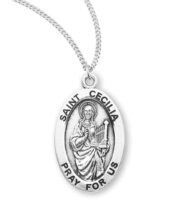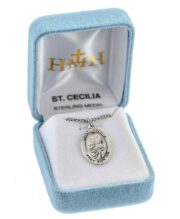Saints
Popular Women Martyrs
Popular Women Martyrs
In the ten great persecutions of the Church in the Roman Empire, thousands of Christians were martyred for their faith. Among the most well known women martyrs of this time are: St. Perpetua, St. Felicity, St. Cecilia, St. Barbara, St. Agatha, St. Agnes, St. Lucy and St. Dorothy. The holy lives of these women serve as a model for each of us to emulate.
The stories of these women martyrs were not usually written down at the time of their death but were handed down from generation to generation by word of mouth. By the time the stories of these famous women martyrs were finally written down they had become embellished with many legends, and today it is impossible to distinguish fact from fancy.
Still, the Church holds the lives of these popular women martyrs in high esteem. Six of the eight are named in the Canon of the Mass. Four of these six are also mentioned in the Litany of the Saints Despite the popularity of these girl martyrs, few details are known about most of them. Below you will find what factual information is available for each of these popular women martyrs.
St. Perpetua and St. Felicity
An exception is the case of Saint Perpetua and Saint Felicity and their holy companions. We have detailed record of their martyrdom. More than a third of this narrative was written by St. Perpetua herself while she was awaiting her death; part was written by St. Saturus, a fellow prisoner and martyr, and the remainder was written by an unknown person who was an eyewitness of the martyrdom.
Five people who were taking instructions in the Christian faith were arrested in Carthage in the year 203. They were Perpetua, a young married woman who had a baby son; Felicity, a slave girl who was expecting a baby; and three men: Saturninus, Secundulus, and Revocatus. These five were joined by Saturus, their instructor in the faith, who voluntarily shared their imprisonment.
At first, they were kept under guard in a private house; Perpetua’s father was an old man and a pagan. Her mother and two brothers were either Christians or were taking instructions. Her father came to visit her and begged her in vain to renounce Christianity so she could save her life. “I grieved for my father,” she said, “for he alone of all my kin would find no comfort in my suffering. The five catechumens were baptized during the period they were under arrest.
Sacred Visions
At the time of her baptism Perpetua asked God for nothing but the power to endure the sufferings that were coming “A few days later we were lodged in prison, and I was greatly frightened because I had never known such darkness. What a day of horror! Terrible heat, owing to the crowds! Rough treatment by the soldiers! To crown all I was tormented with anxiety about my baby.” Perpetua had her baby in prison with her because he had not yet been weaned. In those days, bottle feeding was unknown and a baby that could not be breast fed would die.
Perpetua had a dream in which she saw a narrow golden ladder reaching up into heaven. On the sides of the ladder were swords, lances, and hooks which would mangle anyone who made the ascent carelessly. At the foot of the ladder was a huge dragon. Saturne climbed the ladder and then called down to Perpetua: “I wait for you, but take care lest the dragon bite you.”
She said: “In the name of Jesus Christ, he will not hurt me.” The dragon meekly put his head down, and she climbed the ladder. At the top of the ladder there was a garden where a white haired shepherd was milking sheep while thousands of people clad in white stood around him. The shepherd said, “Welcome, child,” and gave her some curds of milk which she ate. Those who stood about said: “Amen.”
Refusal to Worship Pagan Gods
A few days later the prisoners were taken to the market place for their trial. The procurator begged Perpetua to offer a sacrifice to the pagan gods. “Spare your father’s white hairs,” he said. “Spare the tender years of your child.” She refused. Her father tried to plead with her but he was beaten with a rod. “This I felt as much as if I myself had been struck, so greatly did I grieve to see my father thus treated in his old age. Then the judge passed sentence on us all and condemned us to the wild beasts.” They were to be put to death during the games held in honor of the festival of Geta Caesar.
When sentence was passed Perpetua’s baby was taken from her. God was good to her, she reported, for God so willed it that the baby no longer needed to be nursed, “nor did the milk in breasts my pain me.” A few days later Perpetua dreamed of a brother, Dinocrates, who had died at the age of seven. He looked hot and thirsty and was trying to drink from a fountain that was too high for him to reach. She awoke and prayed for him every day.
On the day before she was to go to her death she had another dream. The fountain was lower now and overflowing with water. Dinocrates played happily and went to drink from the fountain. “And so I awoke and I knew he suffered no longer.”
She had another dream in which she had to fight an ugly Egyptian. A man of huge stature, in beautiful clothes, told her that if she defeated the Egyptian she would get the bough with golden apples that he held in his hand. She defeated him and received the bough. “And so I awoke. And I saw that I should not fight with beasts but with the Devil; but I knew victory would be mine. I have written this up to the day before the games. Of what was done in the games themselves, let him write who will.”
Saint Felicity was worried that she might not be able to suffer martyrdom with the others, for it was unlawful to execute a pregnant woman. Her fellow prisoners joined her in prayer, and two days before the games, she gave birth to a girl who was adopted by a Christian. Her labor was difficult and one of the guards said to her: “You suffer now, but what about when you are thrown to the beasts?”
Felicity answered: “Now I suffer what I suffer, but then another will be in me who will suffer for me, because I am to suffer for Him.” The day before the games the prisoners were given the customary last meal, which was eaten in public. To those who crowded around, they spoke of God’s judgments and of the joy of their own suffering. Many were converted.
The Martyrdom of St. Felicity, St. Perpetua, and their Companions
On the day of the games the prisoners marched into the amphitheater. The three men came first (Secundulus had died in prison), followed by Felicity, “from the midwife to the gladiator, to be washed after childbirth in a second baptism.” Last of all came Perpetua, singing a psalm of triumph. Saturninus and Revocatus were attacked first by a leopard and then by a bear, but the animals did not kill them.
Saturus was exposed to a wild boar, but the boar turned on the keeper, wounding him so severely that he died within a few days. Then Saturus was tied up before the bear, but the bear refused to come out of his den. Next a leopard was turned loose. The leopard sprang upon him and in a moment he was covered with blood. The mob jeered and cried out: “He is well baptized!” Saturus dipped a ring in his blood and gave it to the jailer, Pudens, saying: “Farewell! Remember the faith and me. And let not these things disturb but strengthen you.” And so Saturus died, going to await Perpetua, as in the dream. Pudens later became a martyr.
The two women were thrown to a savage cow which tossed them both. Perpetua pinned up her disheveled hair lest she seem to mourning. Then she helped Felicity to her feet. Perpetua seemed emerge from a state of ecstasy and asked when they were to thrown to the cow. When she was told that this had already happened she could scarcely believe it. She turned to her brother and another catechumen and said: “Stand fast in the faith, and love one another. And do not let our sufferings be a stumbling block to you.” The four prisoners were taken to the center of the arena and struck with swords. Saturninus, Revocatus, and Felicity died without a stir.
But Perpetua’s executioner was a novice who failed to kill her with the first blow, so that she shrieked with pain. His second blow found her throat. That is the story of the martyrdom of St. Perpetua, St. Felicity, and their companions as told in the ancient document.
St. Cecilia
Saint Cecilia was a member of a noble family in Rome. She became a Christian through the teachings of her childhood nurse. She married a young Roman named Valerian, but, by mutual agreement, she kept the vow of virginity which God had inspired her to make. Because of Cecilia’s example, Valerian came into the Church and was followed by his brother. The two brothers were arrested and put to death for their Christianity. Cecilia recovered their bodies and gave them a decent burial. This was considered a “treasonable” act, and she, too, was put to death on November 22, about the year 230.
Pope St. Paschal (817-824) built the Church of St. Cecilia in Rome. At that time, St. Cecilia appeared to him in a dream and told him where her body could be found. He had her remains transported to the church, and they are in the restored church today. Below the table part of the altar is a statue carved by Stefano Maderno, in 127. It bears the inscription: “Behold the body of the most holy virgin Cecilia, whom I myself saw lying incorrupt in her tomb. I have in this marble expressed for thee the same saint in the very same posture of body.” It is not known whether Cecilia was a musician, but we are told that there was always “a hymn of love for Jesus Christ, her true spouse, in her heart.” She has been named the patron saint of musicians.
St. Barbara
Saint Barbara was a member of a noble family in Heliopolis, in northern Egypt. We are told that she was denounced by her own father when she became a Christian, was arrested and put to death in the year 235. She is invoked against final impenitence and sudden death. She has procured the last sacraments for her clients, even when miraculous intervention was required. Both Catania and Palermo in Sicily claim the honor of being Agatha’s birthplace.
In the region around Mt. Etna she is invoked against eruptions of the volcano, and in other places she is invoked against lightning. It is believed that she was put to death in the persecution of Decius, 250–253. Agnes is one of the best known of all saints even though the known facts about her are meager. When she was only thirteen years old she attracted the eye of Eutropius, son of a Roman governor. She refused to marry him because she had dedicated her virginity to God.
Eutropius, therefore, denounced her as a Christian, and she was summoned before the governor. The governor tried soft words and flattery at first and then dire threats. When nothing would induce her to marry or to compromise her faith, she was put to death.
St. Agnes
Saint Agnes is remembered for her purity, her love of Jesus, and her courage when threatened with violent death. She is usually represented holding a palm branch, symbol of her martyrdom, and with a lamb, representing purity, at her feet. The Church gives her a complete Mass on January 21 – an honor not accorded many saints.
St. Lucy
Saint Lucy met her martyrdom in Syracuse, on the island of Sicily, the same city in which she had been born. She is the patron of Syracuse. The Church has honored Lucy in a special way, for along with Agatha, Agnes, Cecilia, Perpetua, and Felicity, she is mentioned the Canon of the Mass. She is also mentioned in the Litany of the Saints, along with Agatha, Agnes, and Cecilia.
St. Dorothy
Saint Dorothy was a Christian girl whose home was in Caesarea in Asia Minor. She was condemned to death during the persecution under Diocletian. During the last hours of her life she brought back to Christ two young women who had apostatized. A religious community city founded in Italy bears her name; its members are known as the Sisters of St. Dorothy, or Dorothean Sisters. The body of the saint is venerated in the Church of St. Dorothy in Rome.

